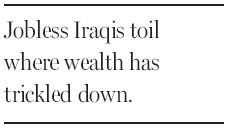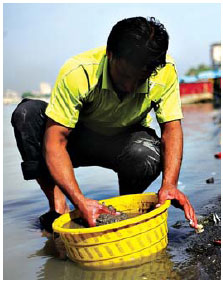Society
Baghdad's gold rush deep in the sewers
Updated: 2011-06-19 07:45
By Michael S. Schmidt and Yasir Ghazi (New York Times)
|
Iraqi men sift through sewers, streets and the Tigris River, above, for gold dust from Baghdad's jewelry district. Ayman Oghanna for The New York Times |
BAGHDAD - Deep below the workshops in Baghdad's cramped, run-down jewelry district, unemployed men spend their days scouring the city's sewer system for the one thing they say can bring them money: flakes of gold.
Several times a month, men desperate for an income descend more than four meters into the dark in search of gold bits that have been washed down the drain by craftsmen cleaning up after a day of etching and molding jewelry. With a flashlight in hand and a mask to help with the stench, they spend hours combing through the thick muck, reaching in with their bare hands to pluck out glints of gold.
On a good day, the men say they collect enough to earn about $20 from a smelter, which sells reconstituted blocks of gold back to the same jewelers whose pipes seed the sewers.
"Because it's disgusting and dirty," said Ali Mohammad Freji, 30, "I do not tell my family what I do because I'm embarrassed."
Mr. Freji is among a group of about a dozen men who search for gold on a daily basis. Their plight illustrates the larger problems that still exist in Iraq's economy eight years after the American invasion.
Despite the billions of dollars spent by the United States and other countries to try to rebuild the country's infrastructure and buoy its economy, there are still too few jobs, with as many as 40 percent of the work force either unemployed or reliant on part-time work.
But the jewelry district is the one place where the wealth has trickled down, literally, from the jewelry shops to the sewers.
"Thank God for everything we got. It's a small thing that nobody cares about, but it means a lot to me," said Abbas Abdul-Razzaq, 30, who searches the sewers for gold.
The men search about eight sewers once a month. When they are not underground, they sweep the streets of the jewelry district in search of gold dust that has been created in the process of making the jewelry.

Although the price of gold has skyrocketed in recent years, the men here said they were making less money because of reverberations from the war and advances in technology in jewelry making.
After the United States invaded Iraq in 2003 and years of sectarian war ensued, many of the city's jewelers fled, leaving a void in jewelry production.
With few tariffs on imports, cheaper and better designed jewelry from the United Arab Emirates and Turkey flooded into Iraq, making it difficult for the remaining jewelers to compete with the imports.
"Before, we considered ourselves lucky because there are so many workshops," Mr. Freji said. "The government's policy of not having tariffs hurts us because there are no longer many gold shops."
Those remaining goldsmiths rely on more efficient machinery, and fewer flecks are washing into the sewers.
The work of sifting through sewage is dirty, smelly, and not surprisingly the men said they hated it. Their feet and hands are irritated from spending so much time in water, and their legs ache from squatting.
"I wish I could find another job," said Mr. Abdul-Razzaq. "I'd take any job - anything, I just want a permanent job."
The New York Times

Specials

My China story
Foreign readers are invited to share your China stories.

Pret-a-design
Though Elisabeth Koch did not attend the Aprilweddingof Prince William and Kate Middleton in London, her tailor-made hats might have.

Mom’s the word
Italian expat struggles with learning English and experiences the joys of motherhood again.
